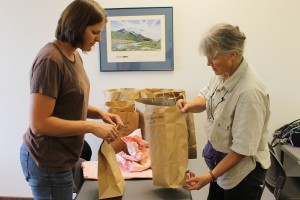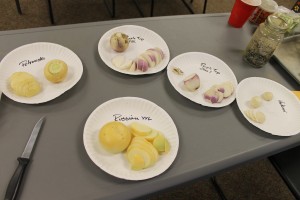Turnip testers grow popular varieties, create new ones
September 10, 2013

Nancy Tarnai
907-474-5042
9/10/13
Turnips may not rank as a favorite vegetable for many people, but the old-time root crop has its place on the nutrition-conscious plate.
The plants, which grow wild in Siberia, have been a long-standing food source for humans and animals. In addition to the roots, the greens are a great source of calcium, vitamins C and E, beta-carotene and manganese. In these antioxidant-crazed times, the turnip is a real winner.
You don’t have to sell local farmer Kurt Wold on that information. He’s been producing turnips for years and this spring launched the Alaska Turnip Project, with 30 growers participating, and not just in Fairbanks. In addition to private farms, all the Calypso Farm and Ecology Center school gardens took part.
Growers in Valdez and Anchorage got in on the act too. The rubber met the road on Aug. 14 and 15 when turnip tasting and seed processing workshops were held. Farmers, gardeners and visitors sampled raw turnips, with the purple top appearing to be the favorite. “Purple sells,” Wold said.
Growers each got two different turnip seed types to plant in the spring. Wold conceived of the project after he realized he can only grow so many turnips. “I’m farming out my farming,” he said. “I’m a voyeur in plant breeding.”
Participants didn’t know what varieties of turnip they were growing until harvest time. While the seeds were being cleaned and saved, Wold displayed the types of turnips and invited everyone to taste them. The varieties were Petrowski, two kinds of purple top, Hakurei, Russian XXL and Kuziku (more of a rutabaga). There were also some crosses, creating totally new turnips. “Whatever a true turnip means I don’t know,” Wold said.
Early producers that are resistant to root rot were what Wold was looking for. Taste, of course, is another critical factor. Through this plant breeding project, Wold was simply hoping other growers could share the “on the ground” research and save the seeds. “Hopefully we’ll see what the freaks are and find some that are exceptional. We’ll see if we can produce something similar next year.”

He has a big vision for the project. “I hope it continues many years, long after I’m dead and gone,” Wold said. As the state’s only commercial vegetable seed producer, he can try innovative methods to come up with hardy crops that have desirable traits. “I’m looking for consistency,” he said. Next year the seeds created from the crosses this year will be planted. “That will be a time for learning, experimenting and joy. We’ve got to keep growing.”
Initially the seeds for this summer’s undertaking came from the USDA and Seed Savers Exchange in England.
While growing turnips is easy, according to Wold, the project was more difficult. –‘”˚…Á Cooperative Extension Service helped him get the word out to constituents and hosted one of the tasting parties.
Farmers made notes about their turnip growing experiences to share with Wold and CES. Heather Koponen was a willing participant. ‘I’m all for getting better vegetables,” she said. “I just put the seeds in the ground and watered and they grew themselves.”
About half the plants processed didn’t end up making much seed but Wold wasn’t upset. “I have low expectations,” he said. “Then I’m pleasantly surprised. If I had high expectations I might be disappointed.
“Even if the turnip project fails it’s educational.”
Wold was hoping to discover which seeds work best. He’s going to mix the new seeds and dole out packets again next spring. “I’m just hoping to get feedback,” he said. “This will be new varieties previously unknown to humankind.”
Anyone interested in growing turnips in the 2014 season should contact Wold at 479-7977 or Steven Seefeldt, –‘”˚…Á CES agent, 474-2423 or ssseefeldt@alaska.edu.
This column is provided as a service by the –‘”˚…Á School of Natural Resources and Agricultural Sciences and the Agricultural and Forestry Experiment Station. Nancy Tarnai is the school and station‚Äôs public information officer. She can be reached at ntarnai@alaska.edu.
SIDENOTE:
Wold will be assisting with a tomato seed saving workshop Sept. 14 from 2 to 4 p.m. at Hartung Hall in Ester. Bring ripe tomatoes, glass jars and lids, towels and a sharp knife. Tomato tasting is included. There is no charge to attend but donations are appreciated, as this is part of the John Trigg Ester Library’s Growing Ester’s Biodiversity program. Contact Deirdre Helfferich, estereditor@gmail.com, 479-3368 for more information.


